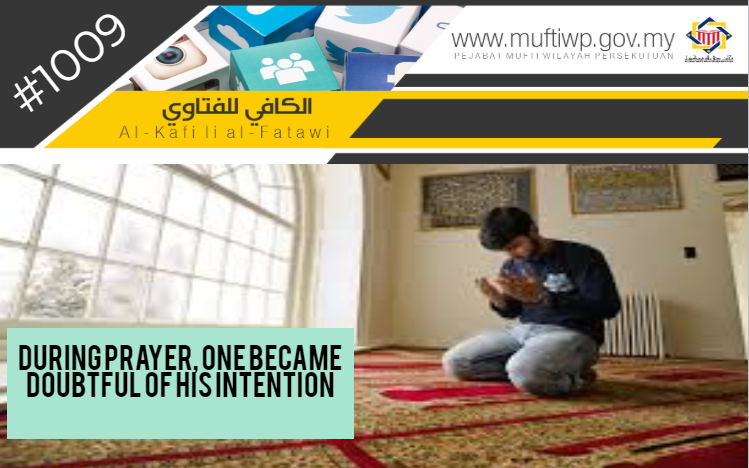Question:
Assalamualaikum SS Dato’ Seri Mufti. If someone is praying Zohor and in his second rakaat, doubts start to creep in, as to whether he set the intention of praying Zohor or Asar. After some time, he is certain that his initial intention is Zohor. Is his prayer valid?
Answer:
Alhamdulillah, praise and thanks to Allah for the countless blessings He has blessed us all with. Blessings and salutations to the Prophet Muhammad PBUH, his wives, his family, companions and all those that follow his teachings to the day of judgement.
We will start with a hadith from Umar bin al-Khattab RA, where he said, I heard the Prophet PBUH said:
إنَّمَا الْأَعْمَالُ بِالنِّيَّاتِ، وَإِنَّمَا لِكُلِّ امْرِئٍ مَا نَوَى، فَمَنْ كَانَتْ هِجْرَتُهُ إلَى اللَّهِ وَرَسُولِهِ فَهِجْرَتُهُ إلَى اللَّهِ وَرَسُولِهِ، وَمَنْ كَانَتْ هِجْرَتُهُ لِدُنْيَا يُصِيبُهَا أَوْ امْرَأَةٍ يَنْكِحُهَا فَهِجْرَتُهُ إلَى مَا هَاجَرَ إلَيْهِ".
“Actions are to be judged only by intentions and a man will have only what he intended. When one’s emigration is to Allah and His Apostle, his emigration is to Allah and His Apostle but his emigration is to a worldly end at which he aims or to a woman whom he marries, his emigration is to that for which he emigrated.”
Sahih al-Bukhari (1) and Sahih Muslim (1907)
Among the wisdoms from the above hadith:
- Scholars agreed in stating that every action of a mukallaf mukmin will not be considered according to syarak nor will it be rewarded unless it is made with the intention. This is agreed upon by Ibn Hajar al-Asqalani stating: “Deeds that are in accordance with syarak.”
Intention is one of the direct requisites in intrinsic or direct worship (العبادة المقصودة), such as prayer, hajj and fasting. All these worships are invalid unless with the presence of intention. While, for extrinsict or indirect worships or a means for worship such as ablution and ghusl (bath), then the scholars of madhab Hanafi state that intention is just a condition of the perfection of worship to gain its rewards. For scholars of madhab Syafie and others, they state that it is a valid condition for worship. Hence, indirect worships are invalid without intention.
- The meaning of intention according to Syiekh al-Sa’di is purposeful act of worship to get closer to Allah SWT, gain His blessings and rewards. The Prophet PBUH said: “Indeed, every deed depends on the intention,” refers to acts of worship and not permissible acts nor is it makruh or prohibited deeds.
- Imam al-Ghazali said: “A good and sincere intention for Allah Rabb al-Alamin are far greater than a deed with the intention to get some worldly gains. A good and sincere intention is the very reason of the acceptance of the deed by Allah SWT. While for bad intentions, it will surely remove one’s obedience and results in love towards sins and transgressions. Consequently, sins and transgressions, it will only bring the feelings of regret and loss. Hence, sincerity is the highlight of acceptance of a deed in any field, of whether it is accepted or not by Allah SWT.” (See al-Kafi Syarah Hadis 40, 8)
Answering the above question, certainty cannot be removed by subsequent doubt. This is in line with the Islamic legal maxim:
الْيَقِينُ لَا يَزُولُ بِالشَّكِّ
“Certainty cannot be removed by doubt.”
Ibu Nujaim said: “It is impossible for a doubt to remove a certainty that precedes it.” (See: al-Asybah wa al-Naza'ir by Ibn Nujaim, pg. 56)
Hence, when someone is praying and then doubt, then the doubt is not considered and the prayer is valid.
Syeikh Daud al-Fatani in his book stated: “Doubt that come in when one is praying does not harm the prayer after certainty comes afterwards.” (See Lihat Furu’ al-Masa’il tahqiq by Datuk Seri Abu Hasan Din al-Hafiz, pg. 321)
We hope that Allah SWT accept all of our prayers by following the conditions set by syarak and being sincere towards Allah SWT. Allah SWT stated:
وَمَا أُمِرُوا إِلَّا لِيَعْبُدُوا اللَّـهَ مُخْلِصِينَ لَهُ الدِّينَ
“And they were not commanded except to worship Allah, [being] sincere to Him,”
Surah al-Bayyinah (5)
Imam Nawawi Rahimahullah explains regarding the matter of worship and good intention saying: Indeed, worship is divided into three parts:
- Worship that is done due to fear of Allah SWT is considered as the worship of a slave.
- Worship that is done to gain rewards and paradise is the worship of a merchant.
- Worship that is done because of one’s consciousness of Allah SWT and his rights as a slave, proving his gratitude and feeling that he is lacking in his remembrance. Fearful that his deeds are not accepted. This is known as the worship of a free man. (See Soal Jawab A – Z tentang Tasawwuf (A-Z Questions on Tasawwuf), pg. 98)
Hopefully, this explanation will make us be conscious in the fiqh of prayer according to syarak. Amin.


